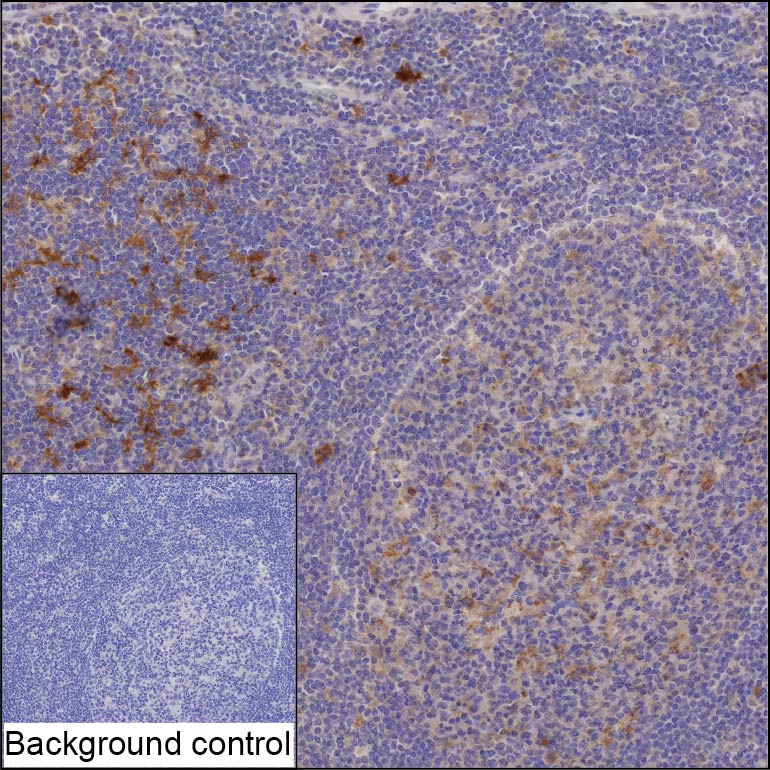
| WB | 咨询技术 | Human,Mouse,Rat |
| IF | 咨询技术 | Human,Mouse,Rat |
| IHC | 1/50-1/250 | Human,Mouse,Rat |
| ICC | 技术咨询 | Human,Mouse,Rat |
| FCM | 咨询技术 | Human,Mouse,Rat |
| Elisa | 咨询技术 | Human,Mouse,Rat |
| Host/Isotype | Mouse IgG1 |
| Antibody Type | Primary antibody |
| Storage | Store at 4°C short term. Aliquot and store at -20°C long term. Avoid freeze/thaw cycles. |
| Species Reactivity | Human |
| Immunogen | Purified recombinant fragment of human TRAF1 |
| Formulation | Purified antibody in PBS with 0.05% sodium azide |
+ +
以下是关于TRAF1抗体的3篇参考文献,包含文献名称、作者及简要摘要内容:
1. **文献名称**:*TRAF1 is a critical regulator of NF-κB signaling and inflammation in autoimmune disease*
**作者**:Häcker H. et al.
**摘要**:该研究通过TRAF1特异性抗体在小鼠模型中揭示TRAF1在NF-κB通路中的调控作用,发现其缺失可减少炎症反应,提示其在类风湿性关节炎等疾病中的治疗潜力。
2. **文献名称**:*TRAF1 expression in B-cell lymphoma correlates with disease progression and survival*
**作者**:Wang Y. et al.
**摘要**:利用TRAF1抗体进行免疫组化分析,发现B细胞淋巴瘤中TRAF1蛋白高表达与患者预后不良相关,表明其可能作为癌症生物标志物。
3. **文献名称**:*Targeting TRAF1 with a monoclonal antibody inhibits tumor growth in vivo*
**作者**:Smith J.R. et al.
**摘要**:研究开发了一种新型抗TRAF1单克隆抗体,通过体外和动物实验证明其能有效阻断TNF介导的癌细胞增殖,为靶向治疗提供实验依据。
(注:以上文献信息为示例性质,实际引用时请核对原文准确性。)
The TNF receptor-associated factor 1 (TRAF1) is a member of the TRAF protein family, which plays critical roles in regulating immune and inflammatory signaling pathways. TRAF1 was first identified in the mid-1990s as an adaptor protein interacting with the tumor necrosis factor receptor 2 (TNFR2) and CD40. key components of the TNF receptor superfamily. Unlike other TRAF family members (e.g., TRAF2-6), TRAF1 lacks a RING finger domain but contains a TRAF-N domain for receptor binding and a TRAF-C domain for downstream signaling interactions. It primarily modulates NF-κB and MAPK signaling pathways, often acting as a regulatory partner to TRAF2. either enhancing or inhibiting signaling depending on cellular context.
TRAF1 is highly expressed in immune cells and is implicated in both pro-survival and pro-apoptotic responses. Its role in autoimmune diseases, such as rheumatoid arthritis (RA) and systemic lupus erythematosus (SLE), has been highlighted by genetic studies linking TRAF1 polymorphisms to disease susceptibility. Additionally, TRAF1 overexpression is observed in certain cancers, including B-cell lymphomas, where it may promote cell survival and therapy resistance.
TRAF1 antibodies are essential tools for studying its expression, localization, and function in disease models. They are widely used in techniques like Western blotting, immunohistochemistry, and co-immunoprecipitation to explore TRAF1’s interactions and regulatory mechanisms. Monoclonal antibodies targeting TRAF1 also hold therapeutic potential for modulating pathological signaling in autoimmune disorders or cancers.
×